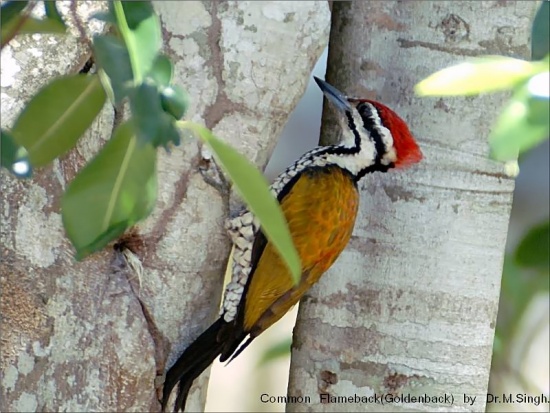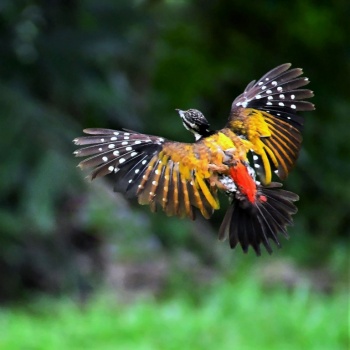
Kuala Selangor Nature Park, Kuala Lumpur, Malaysia, November 2005
Alternative Name: Common Goldenback
- Dinopium javanense
Identification
Size - 28-30cm (11-12in)
Golden mantle and wings, red lower back and rump, white face with two black malar strips and largely black hindneck with white sides of neck together with whitish underparts marked with blackish scales, distinctive. Throat and face tinged rufous or buff. Has three toes. Brown iris.
Male: Crown and pointed crest red
Female: Crown and crest black with whitish spots from forehead to the tip of the crest.
Similar Species
Difficult to separate from Greater Flameback (Goldenback) from lateral view, especially at a distance. Best separated by colour of iris and hindneck pattern.
Distribution
Asia: found from India to Indochina; Greater Sundas; Philippines.
Taxonomy
Spot-throated Flameback was formerly included in this species.
Subspecies
There are 6 subspecies[1]:
- D. j. malabaricum:
- In wet woodlands of western India
- D. j. intermedium:
- In Bangladesh and Assam to Burma, south-western China and Indochina
- D. j. javanense:
- D. j. borneonense:
- Borneo (except northeast)
- D. j. exsul:
- D. j. raveni:
- On Eraban Island and adjacent north-eastern Borneo
Habitat
Mangroves, deciduous forests, forest edges, peat swamp forests, coastal scrub, gardens and plantations. Range from lowlands to foothills.
Behaviour
Very social, regularly call out to each other.
Breeding
They raise their crests, bow and swing their heads during displays. The male will feed the female during courtship. Nests in holes in trees and palms at less than 10 m above ground. Usually, the nest tree will be in a relatively open area. The clutch consists of 2 or 3 eggs.
Diet
Usually seen in pairs, largely on tree trunks and stems probing soft bark for insects and grubs. Their diet also consists of ants, larvae, cockroaches and small scorpions.
Vocalisation
Voice: a sharp rattling churrrr and several other vocalizations.
Flight call: kowp-owp-owp-owp.
Also drums, but not so loudly as Buff-spotted Flameback
References
- Clements, J. F., P. C. Rasmussen, T. S. Schulenberg, M. J. Iliff, T. A. Fredericks, J. A. Gerbracht, D. Lepage, A. Spencer, S. M. Billerman, B. L. Sullivan, and C. L. Wood. 2023. The eBird/Clements checklist of Birds of the World: v2023. Downloaded from https://www.birds.cornell.edu/clementschecklist/download/
- Gill, F and D Donsker (Eds). 2012. IOC World Bird Names (version 3.2). Available at http://www.worldbirdnames.org/.
- Birdforum thread discussing taxonomy of several species including this one
- Birdforum Member observations
- Winkler, H. and D. A. Christie (2020). Common Flameback (Dinopium javanense), version 1.0. In Birds of the World (J. del Hoyo, A. Elliott, J. Sargatal, D. A. Christie, and E. de Juana, Editors). Cornell Lab of Ornithology, Ithaca, NY, USA. https://doi.org/10.2173/bow.comfla1.01
Recommended Citation
- BirdForum Opus contributors. (2024) Common Flameback. In: BirdForum, the forum for wild birds and birding. Retrieved 28 April 2024 from https://www.birdforum.net/opus/Common_Flameback
External Links
GSearch checked for 2020 platform.1






